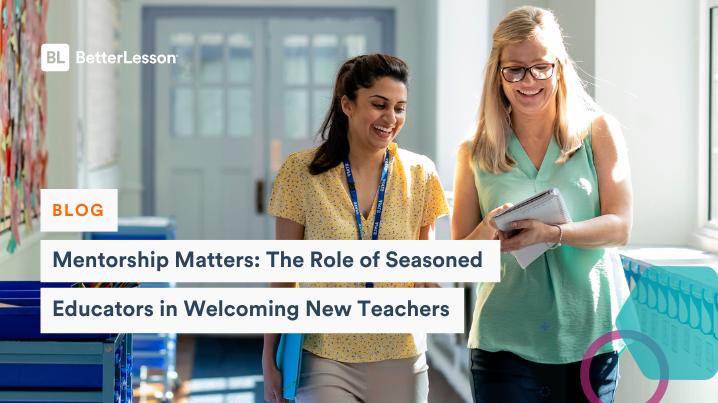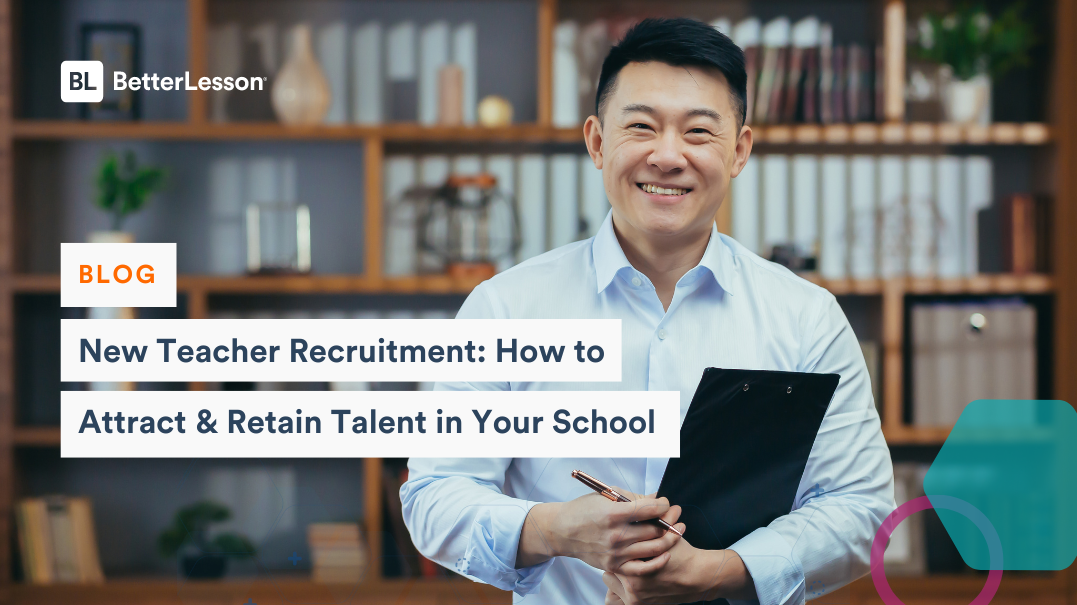The transition from teacher preparation programs to classroom teaching can be stark for many new educators. Often, new teachers enter the classroom with inspiring optimism, creative ideas, and passionate energy. But without the right support, these first years can be overwhelming. A great way to make sure new teachers are set up for success is to provide mentorship opportunities for them. By creating an intentional and welcoming mentorship structure—where new teachers are paired with seasoned teachers—new educators have the support necessary to maintain (and act on!) their enthusiasm for teaching.
In fact, research shows that the impacts of mentoring new teachers can be tremendous and multifaceted, minimizing burnout, increasing retention, and even increasing the academic performance of students.
Here are some tips and strategies for the role of seasoned staff members in welcoming and supporting new educators:
Start with Community and Trust
Effective mentoring relationships require vulnerability and honesty. Without a sense of trust and community, it’s harder for mentees to feel comfortable sharing struggles, frustrations, and needs for support.
From the start of the school year, it’s important for school leaders to center community-building in order to establish trust and build relationships.
This can be done through whole-staff exercises: starting each staff meeting with a circle where everyone answers an ice-breaker prompt; facilitating team-building activities; or staff outings in the community.
This can also be done through small-group exercises: frequent think-and-shares; small group discussions about topics like teaching philosophies and personal experiences in schools; or recurring small group debriefs.
Regardless of the activities you choose, making community-building a priority from day one of the school year helps to create the conditions for more generative, productive, and honest mentor relationships.
Create Intentional Mentor-Mentee Pairings
It’s important to ensure that mentor-mentee pairings are made intentionally and strategically. If the mentor and mentee are fundamentally misaligned with things like teaching philosophies or communication styles, the mentee might not receive the support necessary for the relationship to be impactful.
There are several ways to think about creating more intentional pairings. Here are a few ideas to consider:
- At the start of the year, have new teachers take a survey to self-identify areas of support. For example, a new teacher might identify creating engaging activities as an area of support. At the same time, have seasoned teachers take a survey to self-identify areas of expertise. This way, school leaders can align the needs of mentees with the expertise of mentors.
- After engaging in community-building activities during back-to-school professional development, new teachers might have a sense of seasoned staff members with whom they have positive relationships or common interests. To that end, after participating in several team-building activities, new teachers could identify their top 3 choices for a mentor. This helps to make sure mentees feel agency and comfort with their mentor.
Prioritize Mentoring
Meaningful mentoring takes time and capacity, something that most teachers have very little of. We don’t want mentorship to become another task added to teachers’ already full plates. If this happens, the results of mentoring can cause more harm than good, leading to (rather than alleviating) more burnout and stress.
To prioritize mentoring, school leaders need to structurally embed it into teachers’ schedules. This could look like creating time during staff meetings for mentoring or aligning prep periods with mentors and mentees.
Establish Recurring Support Spaces
Recurring support spaces are low-pressure, drop-in spaces where teachers can go to receive support, ask questions, vent, or just be in community with colleagues. For example, a school might hold a weekly support space every Friday morning before the school day begins. Seasoned mentor teachers might rotate hosting these support spaces. For these teachers, no preparation is required. Rather, these mentor teachers simply open their doors for colleagues to share space with one another in whatever ways they need.
While a traditional mentoring structure allows for depth in one-on-one relationships, these support spaces allow new teachers to gain access to additional mentors, exposure to other ideas, and connection to a broader community and support network.
Outsourced Support
Sometimes, lack of capacity is a real barrier to creating an impactful mentor program. Whether there is a large influx of new teachers or new teachers who have serious needs and gaps in instructional skills, the internal capacity of veteran teachers might not match the needs of new teachers.
BetterLesson is here to collaborate with your district to fill in those gaps and build your capacity! We offer personalized professional learning opportunities, including one-on-one instructional coaching, non evaluative learning walks, and executive coaching for school and district leaders. Our flexible and individualized learning experiences have shown to have tremendous impacts on our partner schools, and we’re eager to support your district in navigating new teacher support and retention systems.
Schedule a call with us today to learn more about how we can collaborate to create a robust and impactful professional learning plan to support your new teachers.
Get in Touch







